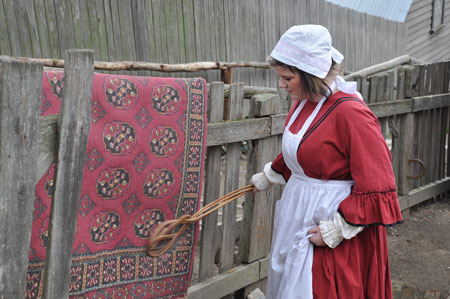
Beating a rug in the mid 1850s. The object in her hand was known as a “carpet beater” and took a fairly strong girl to rid the rug of the accumulation of dirt from the winter. (Sovereign Hill Education Blog, servant-carpet-beating.)
Do you set aside a few days every spring to clean house? I bet few people, if any, do that. But a few generations ago, Spring Cleaning was a must.
That didn’t necessarily mean that housewives were more absorbed with cleanliness than we are today. More dirt and dust found its way into their houses.
Women simply had fewer of the time and energy saving devices we have today. Plus, many women did not work outside the home. So they had more time to do such chores such as ironing the sheets and pillowcases, washing and drying dishes by hand, and of course, cooking more elaborate meals. By elaborate I mean they cooked all foods from scratch. No running by a fast food place on the way home to pick up supper.
For many, many years the working class families ate the main meal at noon. In small towns the volunteer fire department rang the fire alarm to announce it was time to close down for a big meal at home and a short nap.
But back to the cleaning. Rugs and blankets received a good beating out on the clothesline to rid them of mud and dirt. Mattresses were turned and often taken outside to air. Women got down on their hands and knees and scrubbed floors with soap and water; most floors were either wood or covered with linoleum. Windows were washed, as were the window screens. My grandparents had a large wrap-around porch with cement flooring. My grandmother and I washed the porch as soon as the weather warmed up. She took the water hose, sprayed the porch with lots of water, then we took brooms to sweep away mud, wasp nests, leaves, and everything else that found a hiding place during the winter. I thought it was great fun to go barefooted and play in the water.
Closets were gone through and clothing that didn’t fit was given to someone else who could wear it. If no one could be found that was the right size, the fabric could be reused in another item of clothing. Shoes could be resoled.
Seldom was anything discarded. You reused, made do, or did without. But cleanliness was stressed more often in the springtime.
I did have one great-aunt that took the prize for cleanliness. She and her husband lived on the Club Ranch south of Wichita Falls where he was ranch foreman. Aunt Earl believed in cleanliness with a passion. The kitchen was a typical early rural kitchen of the 1900s with linoleum on the floor and wood stove in a prominent space.
Every morning the cowboys came into the kitchen for a cup of coffee and instructions for the day. On a working ranch there was always something to do. Aunt Earl may have fed them breakfast but I don’t recall. Once they went out to start work, she grabbed her bucket and scrub brush to clean the kitchen. She was never able to train those cowboys to scrape their boots or take off their spurs. Believe me, I doubt if any of those men saw another part of the house or sat down in a chair while talking to the foreman.
Aunt Earl was a tiny woman full of energy. I suppose she was so small because she worked so hard. Her sister was more of a town lady and carried a few extra pounds. She always fussed about her weight. I thought if she worked like her sister, maybe she wouldn’t have that problem. But believe me, I never voiced my opinion on that subject. I knew better.
